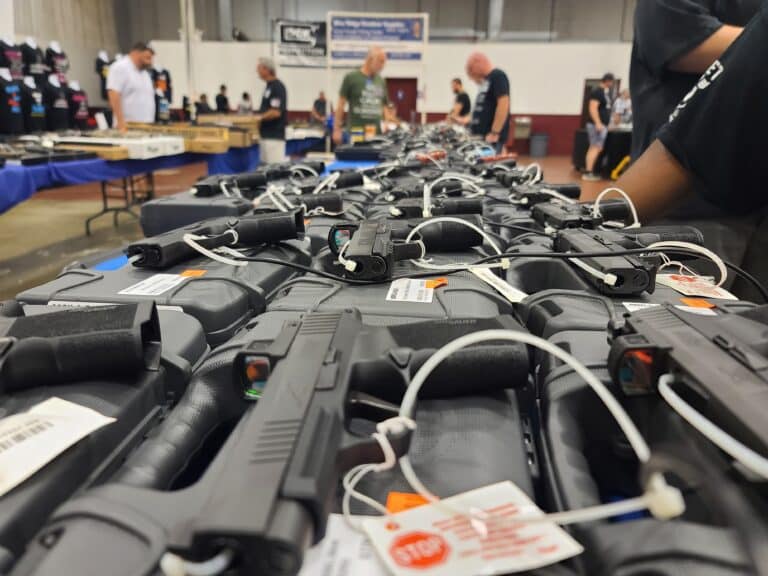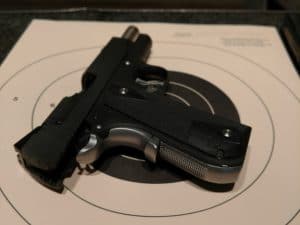Banning users of unlawful controlled substances from possessing firearms violates the Second Amendment. But the same isn’t true for those facing felony indictments.
That was the conclusion U.S. District Judge Louise Flanagan reached on Tuesday when she dismissed one count of an indictment against a North Carolina man for violating the federal prohibition. Flanagan said that drug users are part of “the people” protected by the Second Amendment and that there is no valid historical analogue for permanently disarming them.
“The government has not met its burden of proving that § 922(g)(3) is consistent with the Second Amendment,” Flanagan, a George W. Bush appointee, wrote in U.S. v. Alston. “Thus, defendant’s motion in this part is granted, and count two of the indictment is dismissed.”
At the same time, Flanagan refused to dismiss a separate charge involving the defendant receiving the firearm in question while already under felony indictment for a previous offense. She said the federal felony indictment gun ban fits with the Nation’s historical tradition of firearm regulation.
“Accordingly, defendant’s argument that § 922(n) is unconstitutional under the Second Amendment is without merit, and defendant’s motion in this part is denied,” she wrote.
The ruling adds to a growing split among the federal judiciary as it struggles to determine who can legally be disarmed under the new text-and-history-based Second Amendment test established by the Supreme Court last June. More district courts have ruled to uphold federal drug user prohibition than strike it down. However, the only federal appellate court decision on the matter to date said it was unconstitutional, and the federal government has already formally asked the Supreme Court to step in and resolve the question.
The gun ban for people under felony indictment has seen similar dissension play out in the courts. At least ten other district judges have ruled to uphold it while at least four have said it violates the Second Amendment. The High Court will have a chance to clarify these questions in an upcoming case it has already agreed to hear related to the federal gun ban for people facing domestic violence restraining orders.
Tuesday’s ruling centered around the alleged conduct of Carlos Alston. According to the criminal complaint filed against him in January, Alston was stopped in traffic by a Henderson Police Department officer who recognized him as someone known to have outstanding warrants. Alston then allegedly brandished a firearm, was shot once by the officer, and was eventually taken into custody after a brief chase.
Responding officers recovered the firearm and more than 26 grams of marijuana and related paraphernalia in his vehicle. Further investigation revealed that Alston was already under felony indictment for “assault with a deadly weapon with intent to kill and inflicting serious injury” when he obtained the firearm that police recovered. A grand jury subsequently indicted him on one count of violating the federal gun ban for persons under felony indictment (18 U.S.C. § 922(n)) and one count of possessing a firearm as an unlawful user of a controlled substance (18 U.S.C. § 922(g)(3)). His legal team then moved to have the charges dismissed as unconstitutional under the Second Amendment.
To justify the charge for gun possession as a drug user, the government attempted to argue that unlawful users of drugs were not a part of “the people” covered by the text of the Second Amendment because they are “dangerous and non-law-abiding.”
Judge Flanagan rejected that line of argument because she said neither the Supreme Court nor the Fourth Circuit had ever held that illicit drug users were excluded from Second Amendment protections.
“For purposes of his § 922(g)(3) charge, defendant remains a person who possesses Second Amendment rights,” she wrote.
The government then cited historical laws near the time of the Founding prohibiting the use of firearms at “drinking events” or while a person was intoxicated as historical analogues for the modern drug ban. Flanagan said those laws failed because they were limited to the active use of guns during certain times rather than a blanket gun ban.
“None of these laws, however, forbade the possession or acquisition of firearms; they outlawed only the active use of such weapons at sensitive times,” she wrote. “The government’s reference to nineteenth century laws limiting the intoxicated from using firearms similarly falls short where those laws apply only to actually intoxicated persons, not persons likely so to become.”
She also rejected the government’s comparisons to Founding-era laws disarming slaves, Native Americans, and people who would not take loyalty oaths.
“The ‘why’ of these laws, however, do not neatly map onto the purpose of § 922(g)(3): colonial and early American laws preventing dangerous individuals from owning guns reflected a fear that those guns might be used to overthrow the government, whereas § 922(g)(3) simply seeks to promote public safety.”
“Although the government is correct that ‘violence against the state undoubtedly meant violence against loyal soldiers or innocent civilians,’ historical laws protecting one interest are not a good analogue for modern laws protecting a byproduct of that interest,” she added.
While Alston’s charge for possessing a firearm as a user of unlawful controlled substances was legally suspect, according to Judge Flanagan, his charge for receiving a firearm as someone under felony indictment is on much firmer constitutional ground.
“The case of individuals under felony indictment is one of the ‘straightforward’ instances noted in Bruen, in which the challenged law addresses a societal problem present at the time of the founding,” she wrote.
She reasoned that the Second Amendment could be compared to the Eighth Amendment because both had their roots in the English Bill of Rights. And while the Eighth Amendment protects against “excessive bail,” she said it was never understood “to accord a right to bail in all cases”—particularly for serious crimes like felonies. Therefore, if individuals accused of committing serious crimes could remain detained pre-trial during the Founding, she reasoned that they could also be disarmed.
“The same document thus provides historical support for the individual’s right to bear arms and the government’s ability to detain that individual, suspending temporarily any right to armament, upon probable cause that the individual has committed a felony,” Flanagan wrote. “Where § 922(n) restricts the right of those under felony indictment to bear arms to a lesser degree than restrictions present at the founding, the government has carried its burden to show that the provision is consistent with the Nation’s historical tradition of firearm regulation.”
The U.S. Attorney’s Office for the Eastern District of North Carolina told The Reload it had “no comment on this case.” The office can appeal the decision.






